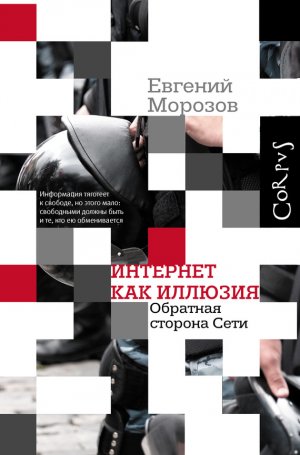Интернет как иллюзия. Обратная сторона сети Морозов Евгений

Miller, Michael E. Mexico Considers Clamping Down on Twitter // Global Post, February 2, 2010. www.globalpost.com/dispatch/ mexico/100128/twitter-crackdown.
Morozov, Evgeny Citizen War-Reporter? The Caucasus Test // Open-Democracy, August 18, 2008. www.opendemocracy.net/article/ citizen-war-reporter.
Negroponte, Nicholas Being Digital. New York: Knopf, 1995. Nicholson, Sophie Internet Spreads Mexico Drug Gang Fears //
Agence France-Presse, April 26, 2010. “No Rapes” in Riot Town // Radio Free Asia, June 29, 2009. Nossiter, Adam Nigerians Recount Night of Their Bloody Revenge //
New York Times, March 10, 2010.
Nyiri, P., Zhang, J., and M. Varrall China’s Cosmopolitan Na-tionalists: “Heroes” and “Traitors” of the 2008 Olympics // China Journal 63 (2010): 25.
O’Hara, K., and D. Stevens The Devil’s Long Tail: Religious Moderation and Extremism on the Web // IEEE Intelligent Systems 24, no. 6 (2009): 37–43.
Osnos, E. Angry Youth: The New Generation’s Neocon Nationalists // New Yorker 28 (2008).
Pallaris, C., Costigan, S. S., and W. B. I. Calcutta Shared Knowledge, Joint Pursuits: International Relations Beyond the Age of Information. Working Paper, May 24, 2010.
Peoples, C. Technology, Philosophy and International Relations // Cam-bridge Review of International Affairs 22, no. 4 (2009): 559–561. Perritt, H. H., Jr. The Internet as a Threat to Sovereignty: Thoughts on the Internet’s Role in Strengthening National and Global Go-vernance // Indiana Journal of Global Legal Studies 5 (1997): 423.
Police Fail to Protect Victims of Neo-Nazi Threats // Prague Monitor, Sep-tember 14, 2009.
Price, M. E. End of Television and Foreign Policy // Annals of the Amer-ican Academy of Political and Social Science 625, no. 1 (2009): 196.
Putnam, R. D. Bowling Alone: The Collapse and Revival of American Community. New York: Simon & Schuster, 2001.
Quarantelli, E. L. Problematical Aspects of the Information / Com-munication Revolution for Disaster Planning and Research: Ten Non-technical Issues and Questions // Disaster Prevention and Management 6, no. 2 (1997): 94–106.
Querengesser, Tim Cellphones Spread Kenyans’ Messages of Hate // Globe and Mail, February 29, 2008.
Rafael, V. L. The Cell Phone and the Crowd: Messianic Politics in the
Contemporary Philippines // Public Culture 15, no. 3 (2003): 399. Rose, N., and P. Miller Political Power Beyond the State: Prob-lematics of Government // British Journal of Sociology 43, no. 2 (1992): 173–205.
Rubio, M. Perverse Social Capital: Some Evidence from Colombia // Journal of Economic Issues 31, no. 3 (1997): 805–816.
Saunders, R. A. Denationalized Digerati in the Virtual Near Abroad: The Internet’s Paradoxical Impact on National Identity Among Mino-rity Russians // Global Media and Communication 2, no. 1 (2006): 43.
Saunders, R. A. Nationality: Cyber-Russian // Russia in Global Af-fairs 2, no. 4 (2004): 156.
Saunders, R. A., and S. Ding Digital Dragons and Cybernetic Bears: Comparing the Overseas Chinese and Near Abroad Russian Web Communities // Nationalism and Ethnic Politics 12, no. 2 (2006): 255–290.
Scheuerman, William E. Liberal Democracy and the Empire of Speed // Polity 34, no. 1 (2001): 41–67.
Scheuerman, William E. Liberal Democracy and the Social Acceleration of Time. Baltimore: John Hopkins University Press, 2004.
Scheuerman, William E. Realism and the Critique of Technology // Cambridge Review of International Affairs 22, no. 4 (2009): 563–584.
Schleifer, Yigal Turkey: The Internet Helps Some Rural Men Prac-tice Polygamy // EurasiaNet.org, October 22, 2009. www.eurasian-et.org/departments/insightb/articles/eav102309a.shtml.
Schlesinger, A., Jr. Has Democracy a Future? // Foreign Affairs 76, no. 5 (1997): 2–12.
Schuler, I. SMS as a Tool in Election Observation // Innovations (2008). Selinger, E. Towards a Reflexive Framework for Development: Tech-nology Transfer After the Empirical Turn // Synthese 168, no. 3 (2009): 377–403.
Sisci, Francesco Who Is Hitting at Hu? // Asia Times Online,
July 24, 2009. www.atimes.com/atimes/China/KG24Ad01.html. Soifer, H., and M. vom Hau Unpacking the Strength of the State:
The Utility of State Infrastructural Power // Studies in Comparative International Development 43, no. 3 (2008): 219–230.
Somalia’s Text Message Insurgency // BBC News, March 16, 2009. Spitulnik, D. Anthropology and Mass Media // Annual Review of
Anthropology 22, no. 1 (1993): 293–315.
Streeten, P. Reflections on Social and Antisocial Capital // Journal of
Human Development and Capabilities 3, no. 1 (2002): 7–22. Suleymanova, Dilyara Tatar Groups in Vkontakte // Digital
Icons 1, no. 2 (2009).
Tamir, Y. The Enigma of Nationalism // World Politics 47, no. 3 (1995): 418–440.
Tehranian, M. Communication and Revolution in Iran: The Passing of a Paradigm // Iranian Studies 13, no. 1 (1980): 5–30.
Traffic Bribery Goes Underground // Daily Nation, October 29, 2009. Trofimov, Y. Taliban Force Cellphone Shutdown in Afghanistan //
Wall Street Journal March 22, 2010.
Trouillot, M. R. The Anthropology of the State in the Age of Globalization // Current Anthropology 42, no. 1 (2001).
Waisbord, S. Democratic Journalism and Statelessness // Political Communication 24, no. 2 (2007): 115–129.
Walby, S. The Myth of the Nation-State: Theorizing Society and Polities in a Global Era // Sociology 37, no. 3 (2003): 529.
Warf, B., and J. Grimes Counterhegemonic Discourses and the In-ternet // Geographical Review 87, no. 2 (1997): 259–274.
Warren, M. E. Social Capital and Corruption. Presentation at Social Capital: Interdisciplinary Perspectives, EURESCO Conference on Social Capital, September 15–20, 2001.
Watts, J. Old Suspicions Magnified Mistrust into Ethnic Riots in Urumqi // Guardian, July 10, 2009.
Weiss, L. Globalization and National Governance: Antinomy or Interdependence? // Review of International Studies 25 (1999): 59–88.
Weiss, L. Globalization and the Myth of the Powerless State // New Left Review 225 (1997): 3–27.
Weiss, L. The Myth of the Powerless State. Ithaca, NY: Cornell Univer-sity Press, 1998.
Zuev, D. The Movement Against Illegal Immigration: Analysis of the Central Node in the Russian Extreme-Right Movement // Nations and Nationalism 16, no. 2 (2010): 261–284.
Achterhuis, H., ed. American Philosophy of Technology: The Em-pirical Turn. Bloomington: Indiana University Press, 2001.
Adas, M. Machines as the Measure of Men: Science, Technology, and
Ideologies of Western Dominance. Ithaca, NY: Cornell University Press, 1990.
Alexander, J. The Sacred and Profane Information Machine: Dis-course About the Computer as Ideology // Archives de sciences so-ciales des religions 35, no. 69 (1990): 161–171.
Alvarez, M. R. Modern Technology and Technological Determinism:
The Empire Strikes Again // Bulletin of Science, Technology & So-ciety 19, no. 5 (1999): 403.
Armitage, J. Resisting the Neoliberal Discourse of Technology: The Po-litics of Cyberculture in the Age of the Virtual Class // CTHEORY 1 (1999).
Balabanian, N. On the Presumed Neutrality of Technology // IEEE
Technology and Society Magazine 25, no. 4 (2006): 15–25. Barbrook, R., and A. Cameron The Californian Ideology // Science as Culture 6, no. 1 (1996): 44–72.
Barley, S. R. What Can We Learn from the History of Technology? //
Journal of Engineering and Technology Management 15, no. 4 (1998): 237–255.
Behringer, W. Introduction: Communication in Historiography //
German History 24, no. 3 (2006): 325.
Beniger, J. R. Control Revolution: Technological and Economic Ori-gins of the Information Society. Cambridge, MA: Harvard University Press, 1989.
Bijker, W. E., Hughes, T. P., and T. J. Pinch, eds. The So-cial Construction of Technological Systems: New Directions in the Sociology and History of Technology. Cambridge, MA: MIT Press, 1989.
Bimber, B. Karl Marx and the Three Faces of Technological Determi-nism // Social Studies of Science (1990): 333–351.
Blondheim, M. News over the Wires: The Telegraph and the Flow of Public Information in America, 1844–1897. Cambridge, MA: Harvard University Press, 1994.
Boccaccio, G. The Decameron, Vol. 1. New York: Modern Library, 1955.
Boorstin, D. J. The Republic of Technology. New York: HarperCol-lins, 1979.
Briggs, A., and P. Burke A Social History of the Media: From
Gutenberg to the Internet. 2nd ed. Malden, MA: Polity, 2005. Cardwell, D. Wheels, Clocks, and Rockets: A History of Technology.
New York: W. W. Norton, 1995.
Carey, J., and J. J. Quirk The Mythos of the Electronic Revolution // American Scholar 39, no. 1 (1970).
Carnes, M. C. The Columbia History of Post-World War II America. New York: Columbia University Press, 2007.
Ceruzzi, P. E. Moore’s Law and Technological Determinism // Tech-nology and Culture 46, no. 3 (2005): 584–593.
Comor, E. Harold Innis and “the Bias of Communication” // Infor-mation, Communication and Society 4, no. 2 (2001): 274–294. Corn, J. J. The Winged Gospel: America’s Romance with Aviation.
Baltimore: Johns Hopkins University Press, 2002.
Cortada, J. W. Do We Live in the Information Age? Insights from His-toriographical Methods // Historical Methods: A Journal of Quan-titative and Interdisciplinary History 40, no. 3 (2007): 107–116.
Cowan, R. S. More Work for Mother: The Ironies of Household Tech-nology from the Open Hearth to the Microwave. New York: Basic Books, 1983.
Craig, D. B. Fireside Politics: Radio and Political Culture in the United States, 1920–1940. Baltimore: Johns Hopkins University Press, 2005.
Czitrom, D. J. Media and the American Mind: From Morse to McLuhan. Chapel Hill: University of North Carolina Press, 1982.
David, P. A. The Dynamo and the Computer: An Historical Perspec-tive on the Modern Productivity Paradox // American Economic Review 80, no. 2 (1990): 355–361.
de la Pea, C. “Slow and Low Progress”, or Why American Studies Should Do Technology // American Quarterly 58 (2006): 915–941.
de la Pea, C., and S. Vaidhyanathan, eds. Rewiring the “Nation”: The Place of Technology in American Studies. Baltimore: Johns Hopkins University Press, 2007.
Diamond, L. Liberation Technology // Journal of Democracy 21, no. 3 (2010): 69–83.
Douglas, S. J. Inventing American Broadcasting, 1899–1922. Baltimore: Johns Hopkins University Press, 1987.
Douglas, S. J. Listening In: Radio and the American Imagination. Minneapolis: University of Minnesota Press, 2004.
Douglas, S. J. The Turn Within: The Irony of Technology in a Globa-lized World // American Quarterly 58, no. 3 (2006): 619–638. Dunlap, O. E., Jr. The Outlook for Television. New York: Harper &
Brothers, 1932.
Durbin, P. T. Technology and Political Philosophy // Technology in Society 6, no. 4 (1984): 315–327.
lliott, E. D. Against Ludditism: An Essay on the Perils of the (Mis)Use of Historical Analogies in Technology Assessment // Southern California Law Review 65, no. 1 (1991): 279.
Ezrahi, Y., Mendelsohn, E., and H. Segal Technology, Pes-simism, and Postmodernism. Boston: Kluwer Academic, 1994. Feenberg, Andrew Alternative Modernity: The Technical Turn in
Philosophy and Social Theory. Berkeley: University of California Press, 1995.
Feenberg, Andrew Marcuse or Habermas: Two Critiques of Tech-nology // Inquiry 39, no. 1 (1996): 45–70.
Feenberg, Andrew Questioning Technology. New York: Routledge, 1999.
Ferkiss, V. C. Man’s Tools and Man’s Choices: The Confrontation of Technology and Political Science // American Political Science Re-view 67, no. 3 (1973): 973–980.
Ferkiss, V. C. Technology and American Political Thought: The Hid-den Variable and the Coming Crisis // Review of Politics 42, no. 3 (1980): 349–387.
Fischer, Claude S. America Calling: A Social History of the Tele-phone to 1940. Berkeley: University of California Press, 1994. Fischer, E. Contemporary Technology Discourse and the Legitimation of Capitalism // European Journal of Social Theory 13, no. 2
(2010).
Forest, Lee De. Television, Today and Tomorrow. New York: Dial, 1942.
Foster, T. The Rhetoric of Cyberspace: Ideology or Utopia? // Con-temporary Literature 40, no. 1 (1999): 144–160.
Friedel, Robert Douglas A Culture of Improvement: Technology and the Western Millennium. Cambridge, MA: MIT Press, 2007.
Galston, W. A. Does the Internet Strengthen Community? // Natio-nal Civic Review 89, no. 3 (2000): 193–202.
Gane, N. Speed Up or Slow Down? Social Theory in the Information Age // Information, Communication & Society 9, no. 1 (2006): 20–38.
Gladney, G. A. Technologizing of the Word: Toward a Theoretical and Ethical Understanding // Journal of Mass Media Ethics 6, no. 2 (1991): 93–105.
Graham, S., and S. Marvin Planning Cybercities? Integrating Telecommunications into Urban Planning // Town Planning Re-view 70, no. 1 (1999): 89–114.
Grier, David Alan When Computers Were Human. Princeton, NJ: Princeton University Press, 2005.
Grint, K., and S. Woolgar On Some Failures of Nerve in Con-structivist and Feminist Analyses of Technology // Science, Techno-logy & Human Values 20, no. 3 (1995): 286.
Halleck, DeeDee Hand-Held Visions: The Impossible Possibilities of Community Media. New York: Fordham University Press, 2002.
Hand, M., and B. Sandywell E-topia as Cosmopolis or Citadel: On the Democratizing and De-Democratizing Logics of the Internet, or, Toward a Critique of the New Technological Fetishism // Theory, Culture & Society 19, no. 1–2 (2002): 197.
Hannay, N. B., and R. E. McGinn The Anatomy of Modern Tech-nology: Prolegomenon to an Improved Public Policy for the Social Management of Technology // Daedalus 109, no. 1 (1980): 25–53.
Headrick, Daniel R. The Invisible Weapon: Telecommunications and International Politics, 1851–1945. New York: Oxford Univer-sity Press, 1991.
Headrick, Daniel R. The Tools of Empire: Technology and European Imperialism in the Nineteenth Century. New York: Oxford Univer-sity Press, 1981.
Headrick, Daniel R. When Information Came of Age: Technolo-gies of Knowledge in the Age of Reason and Revolution, 1700–1850. New York: Oxford University Press, 2000.
Heidegger, Martin The Question Concerning Technology, and Other Essays. New York: Harper Perennial, 1982.
Henderson, Peter Coal Fuels Much of Internet Cloud, Says Green-peace // Reuters, March 30, 2010.
Herf, J. Technology, Reification, and Romanticism // New German Critique (1977): 175–191.
Hine, C. Internet Research and the Sociology of Cyber-Social-Scientific
Knowledge // Information Society 21, no. 4 (2005): 239–248. Hughes, Thomas P. Human-Built World: How to Think About
Technology and Culture. Chicago: University of Chicago Press, 2004.
Hughes, Thomas P. Lusting for the Gratifications of Technology //
Reviews in American History 14, no. 2 (1986): 265–269. Hughes, Thomas P. The Seamless Web: Technology, Science, Etcetera,
Etcetera // Social Studies of Science 16, no. 2 (1986): 281–292. Ihde, Don Ironic Technics. Copenhagen: Automatic Press, 2008. Introna, L. D. Maintaining the Reversibility of Foldings: Making the
Ethics (Politics) of Information Technology Visible // Ethics and In-formation Technology 9, no. 1 (2007): 11–25.
Jacobs, M., Novak, W. J., and J. E. Zelizer The Democratic Ex-periment: New Directions in American Political History. Princeton, NJ: Princeton University Press, 2003.
Jones, S. Fizz in the Field: Toward a Basis for an Emergent Internet
Studies // Information Society 21, no. 4 (2005): 233–237. Katz-Kimchi, M. Historicizing Utopian Popular Discourse on the
Internet in America in the 1990s: Positions, Comparison, and Con-textualization. Presentation at The Long History of New Media conference, Montreal, May 22, 2008.
Kenny, Charles Revolution in a Box // Foreign Policy (November 2009).
Khiabany, G. Globalization and the Internet: Myths and Realities // Trends in Communication 11, no. 2 (2003): 137–153.
Kling, R. Reading “All About” Computerization: How Genre Conventions Shape Nonfiction Social Analysis // Information Society 10, no. 3 (1994): 147–172.
Latour, B., and P. Weibel Making Things Public: Atmospheres of Democracy. Cambridge, MA: MIT Press, 2005.
Layton, E. T., Jr. Technology as Knowledge // Technology and Cul-ture (1974): 31–41.
Mackay, H., and G. Gillespie Extending the Social Shaping of Technology Approach: Ideology and Appropriation // Social Studies of Science 22, no. 4 (1992): 685–716.
MacKenzie, D. Knowing Machines: Essays on Technical Change. Cambridge, MA: MIT Press, 1998.
Mander, J. Four Arguments for the Elimination of Television. Goa, India: Other India Press, 1998.
Mander, J. In the Absence of the Sacred: The Failure of Technology and the Survival of the Indian Nations. San Francisco: Sierra Club Books, 1991.
Manjoo, F. The Co-Founders of Twitter Say It Will Change the World. They Should Remind People That It’s Also Fun // Slate, April 15, 2010.
Marx, L. The Pilot and the Passenger: Essays on Literature, Technology, and Culture in the United States. New York: Oxford University Press, 1988.
Marx, L. Technology: The Emergence of a Hazardous Concept // Social Research 64, no. 3 (1997): 965–988.
McFarland, F. B. Clarence Ayres and His Gospel of Technology // History of Political Economy 18, no. 4 (1986): 617.
McLoughlin, I., Badham, R., and P. Couchman Rethinking Political Process in Technological Change: Socio-Technical Configu-rations and Frames // Technology Analysis & Strategic Management 12, no. 1 (2000): 17–37.
Melzer, A. M., Weinberger, J., and M. R. Zinman Techno-logy in the Western Political Tradition. Ithaca, NY: Cornell Univer-sity Press, 1993.
Merrin, W. Media Studies 2.0: Upgrading and Open-Sourcing the Dis-cipline // Interactions: Studies in Communication and Culture 1 (2009): 17–34.
Michael, D. N. Too Much of a Good Thing? Dilemmas of an Infor-mation Society // Technological Forecasting and Social Change 25, no. 4 (1984): 347–354.
Mickelson, Sig From Whistle Stop to Sound Bite: Four Decades of Politics and Television. New York: Praeger, 1989.
Misa, T. J. How Machines Make History, and How Historians (and Others) Help Them to Do So // Science, Technology, and Human Values (1988): 308–331.
Misa, T. J. Leonardo to the Internet: Technology and Culture from the Renaissance to the Present. Baltimore: Johns Hopkins University Press, 2004.
Misa, T. J. Theories of Technological Change: Parameters and Purposes // Science, Technology, and Human Values 17, no. 1 (1992): 3–12. Misa, T. J., Brey, Philip, and Andrew Feenberg Modernity and Technology. Cambridge, MA: MIT Press, 2004.
Mosco, V. From Here to Banality: Myths About New Media and Com-munication Policy // Seeking Convergence in Policy and Practice (2004): 23.
Mosco, V. Review Essay: Approaching Digital Democracy // New Me-dia & Society (2009).
Mosco, V., and D. Foster Cyberspace and the End of Politics //
Journal of Communication Inquiry 25, no. 3 (2001): 218. Mowshowitz, A. Computers and the Myth of Neutrality / In: Pro-ceedings of the ACM 12th Annual Computer Science Conference on SIGCSE Symposium, 92. 1984.
Munir, K. A., and M. Jones Discontinuity and After: The Social Dynamics of Technology Evolution and Dominance // Organization Studies 25, no. 4 (2004): 561.
Nerone, J. The Future of Communication History // Critical Studies in Media Communication 23, no. 3 (2006): 254–262.
Neuman, J. The Media’s Impact on International Affairs, Then and Now // SAIS Review 16 (1996): 109–124.
Nguyen, A. The Interaction Between Technologies and Society: Lessons Learned from 160 Evolutionary Years of Online News Services // First Monday 12, no. 3–5 (2007).
Nissenbaum, H. How Computer Systems Embody Values // Com-puter 34, no. 3 (2001): 120.
Noble, D. F. America by Design: Science, Technology, and the Rise of Corporate Capitalism. New York: Oxford University Press, 1979.
Noble, D. F. Forces of Production: A Social History of Industrial Automation. New York: Oxford University Press, 1986.
Nye, D. E. American Technological Sublime. Cambridge: MIT Press, 1996.
Olsen, J. – K. B., and E. Selinger Philosophy of Technology:
Five Questions. Copenhagen: Automatic Press/VIP, 2007. Olsen, J. – K. B., Selinger, E., and S. Riis New Waves in
Philosophy of Technology. New York: Palgrave Macmillan, 2009. Ornatowski, C. M. Techne and Politeia: Langdon Winner’s
Political Theory of Technology and Its Implications for Technical Communication // Technical Communication Quarterly 11, no. 2 (2002): 230–234.
Prna, K. Believing in the Net: Implicit Religion and the Internet
Hype, 1994–2001. PhD diss., Leiden University, 2010. Patnode, R. Path Not Taken: Wired Wireless and Broadcasting in the 1920s // Journal of Broadcasting & Electronic Media 49, no. 4 (2005): 383–401.
Pease, E. C., and E. E. Dennis, eds. Radio: The Forgotten
Medium. New Brunswick, NJ: Transaction Publishers, 1995. Pfaffenberger, B. Fetishised Objects and Humanised Nature: Towards an Anthropology of Technology // Man 23, no. 2 (1988): 236–252.
Pfaffenberger, B. Social Anthropology of Technology // Annual Review of Anthropology 21, no. 1 (1992): 491–516.
Pfaffenberger, B. The Social Meaning of the Personal Computer; or, Why the Personal Computer Revolution Was No Revolution // Anthropological Quarterly (1988): 39–47.
Pfaffenberger, B. Symbols Do Not Create Meaning – Activities Do; or, Why Symbolic Anthropology Needs the Anthropology of Techno-logy // Anthropological Perspectives on Technology (2001): 77–86.
Pfaffenberger, B. Technological Dramas // Science, Technology & Human Values 17, no. 3 (1992): 282.
Post, Robert C. Missionary: An Interview with Melvin Kranzberg
// American Heritage of Invention & Technology 4, no. 3 (1989). Post, Robert C. No Mere Technicalities: How Things Work and Why
It Matters // Technology and Culture 40, no. 3 (1999): 607–622. Postman, Neil Informing Ourselves to Death. Speech at the German
Informatics Society, October 11, 1990.
Pursell, C. W., Jr. Government and Technology in the Great Depression // Technology and Culture 20, no. 1 (1979): 162–174.
Radder, H. Normative Reflexions on Constructivist Approaches to Science and Technology // Social Studies of Science 22, no. 1 (1992): 141–173.
Rrup, R. Historians and Modern Technology: Reflections on the Development and Current Problems of the History of Technology // Technology and Culture (1974): 161–193.
Scannell, P. The Dialectic of Time and Television // Annals of the American Academy of Political and Social Science 625, no. 1 (2009): 219.
Schaniel, W. C. New Technology and Culture Change in Traditional
Societies // Journal of Economic Issues 22, no. 2 (1988): 493–498. Segal, H. P. Technological Utopianism in American Culture. Syracuse,
NY: Syracuse University Press, 2005.
Shen, X. The Chinese Road to High Technology: A Study of Telecommunications Switching Technology in the Economic Transition. New York: St. Martin’s, 1999.
Sibley, M. Q. Utopian Thought and Technology // American Journal of Political Science (1973): 255–281.
Smith, M. R., and L. Marx, eds. Does Technology Drive History? The Dilemma of Technological Determinism. Cambridge, MA: MIT Press, 1994.
Sola Pool, Ithiel de Technologies of Freedom. Cambridge, MA: Harvard University Press, 1983.
Spar, D. L. Ruling the Waves: Cycles of Discovery, Chaos, and Wealth from Compass to the Internet. New York: Harcourt, 2001.
Standage, T. The Victorian Internet: The Remarkable Story of the Telegraph and the Nineteenth Century’s On-Line Pioneers. New York: Walker, 1998.
Staudenmaier, J. M. Rationality, Agency, Contingency: Recent Trends in the History of Technology // Reviews in American History (2002): 168–181.
Staudenmaier, J. M. Technology’s Storytellers: Reweaving the Human Fabric. Cambridge, MA: Society for the History of Technology and the MIT Press, 1989.
Stump, D. J. Socially Constructed Technology // Inquiry 43, no. 2 (2000): 217–224.
Sturken, M., and D. Thomas Technological Visions: The Hopes and Fears That Shape New Technologies. Philadelphia: Temple Uni-versity Press, 2004.
Tedre, M., Sutinen, E., Konen, E., and P. Kommers Eth-nocomputing: ICT in Cultural and Social Context // Communications of the ACM49, no. 1 (2006): 130.
Teich, A. H., ed. Technology and the Future. 9th ed. Belmont, CA: Wadsworth/Thomson, 2003.
Thorne, K., and A. Kouzmin Cyberpunk-Web 1.0 ‘Egoism’ Greets Group-Web 2.0 “Narcissism”: Convergence, Consumption, and Sur-veillance in the Digital Divide // Administrative Theory & Praxis 30, no. 3 (2008): 299–323.
Thrift, N. New Urban Eras and Old Technological Fears: Reconfiguring the Goodwill of Electronic Things // Urban Studies 33, no. 8 (1996): 1463.
Van Dijck, J., and D. Nieborg Wikinomics and Its Discontents: A Critical Analysis of Web 2.0 Business Manifestos // New Media & Society 11, no. 5 (2009): 855.
Verheul, J., ed. Dreams of Paradise, Visions of Apocalypse: Utopia and Dystopia in American Culture. Amsterdam: VU University Press, 2004.
Warf, B., and J. Grimes Counterhegemonic Discourses and the In-ternet // Geographical Review 87, no. 2 (1997): 259–274.






